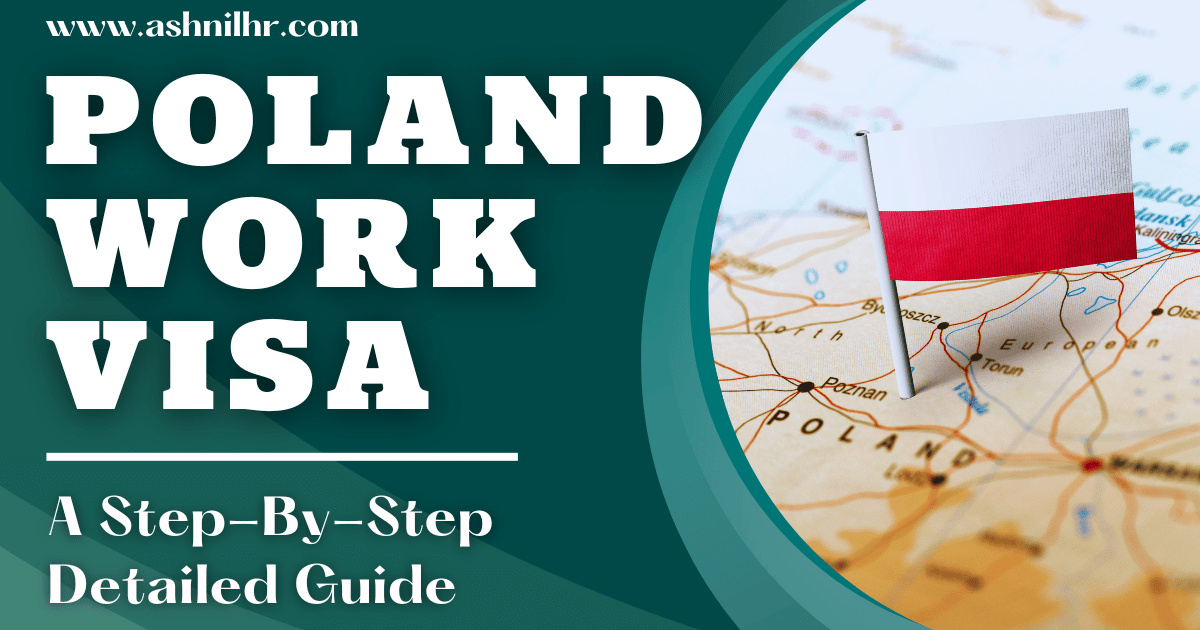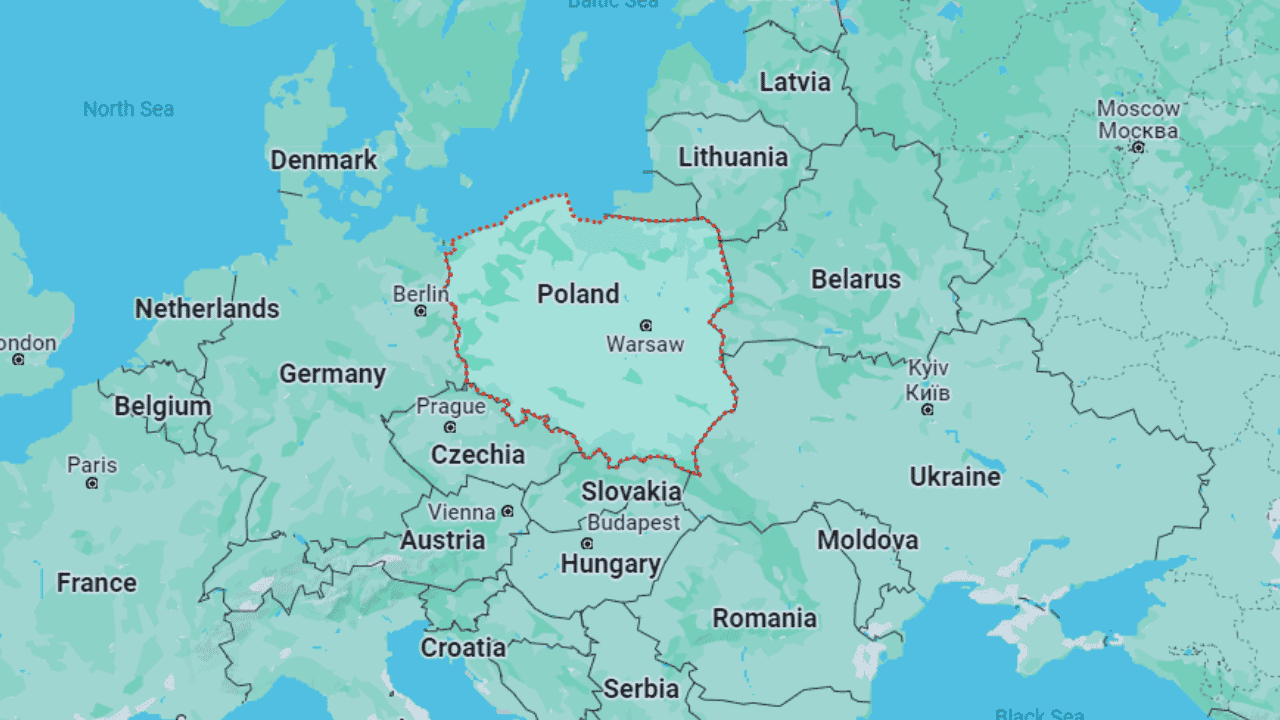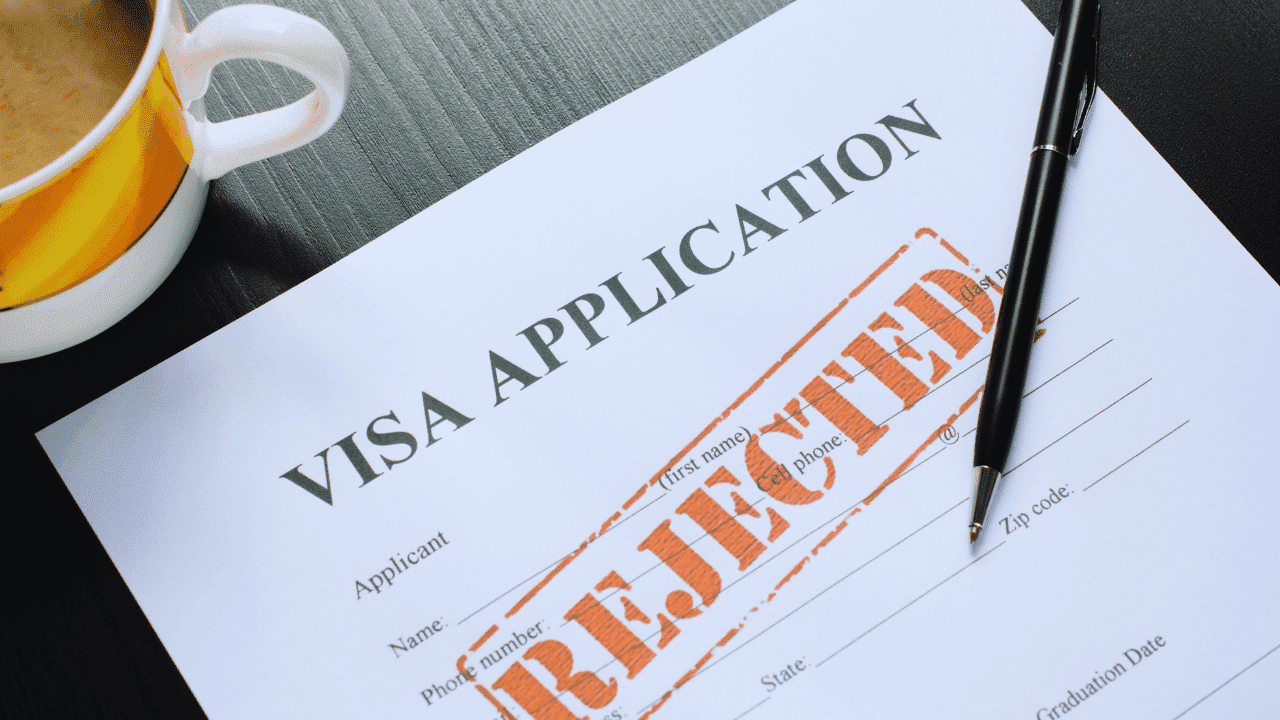Poland Work Visa [Detailed Guide By Experts]
Updated: 16th December 2024

The Poland Work Visa, also known as the D-type national Visa, has become a popular topic in recent years. It is everyone’s right to dream, but how often do dreams actually come true?
Many people aspire to go to Poland but are often discouraged by rumors about the difficulty of securing a work visa. Is that true? To some extent, yes.
However, if you possess proper, genuine, and authentic documents from an established company in Poland that genuinely requires employees, the embassy will likely make a decision in your favor.
Hello, my name is Ashish Paudel, and I am the co-founder and CEO of Ashnil HR Consultants Group. Having spent a significant amount of time in Europe, I’ve gained valuable knowledge and experience in the fields of foreign employment and human resources.
In fact, a few years ago, I also traveled to Poland on a work visa (D-Type National Visa), which makes this article a firsthand, experience-based guide for you.
Over the past eight years, I have guided thousands of individuals, answering countless questions and helping them achieve their European dreams. Through this article, I aim to address all the relevant questions that might arise when considering a Poland Work Visa.
I will keep this guide simple, clear, and easy to understand for everyone.
Let me take you on a journey and help you better understand Poland and Europe. It sounds fun, doesn’t it?
Let’s get started!
Where is Poland, and why do people make Poland their first choice?

Poland is a country located in Europe. It is bordered by Lithuania and Russia to the northeast, Belarus and Ukraine to the east, Slovakia and the Czech Republic to the south, and Germany to the west.
Poland is a European country and a member of the European Union and the Schengen Area. Click here to learn more about Europe, the EU, and Schengen.
Why do people choose Poland?
The simple answer is, “There are a lot of jobs in Poland, and the jobs are for everyone.”
Poland is a highly developed country with an HDI (Human Development Index) of 0.881. The visa process is easy, and many companies don’t require candidates’ academic qualifications for basic jobs such as packing or warehouse helpers.
A packing helper at a warehouse can earn between 4000 PLN and 5000 PLN, equivalent to 940 Euro to 1200 Euro.
The minimum wage in Poland is currently 4,300 PLN per month and is set to increase to 4,670 PLN per month in January 2025.
That is for 8 hours a day and 5 days a week. If you do overtime, you can earn extra up to 5000 PLN.
It’s up to you how many hours a day you can work.
Poland’s currency equivalent to other currencies as of today (16th December 2024)
4300 PLN (Poland) = 1,43,777 NPR (Nepal)
4300 PLN (Poland) = 89,893 INR (India)
4300 PLN (Poland) = 3,00,100 PKR (Pakistan)
4300 PLN (Poland) = 1,26,900 BDT (Bangladesh)
4300 PLN (Poland) = 3,23,100 LKR (Sri Lanka)
4300 PLN (Poland) = 63,000 PHP (Philippines)
4300 PLN (Poland) = 3,900 QAR (Qatar)
4300 PLN (Poland) = 3,990 Dirhams (United Arab Emirates)
4300 PLN (Poland) = 4,057 Saudi Riyal (Saudi Arabia)
What Jobs are available in Poland?

Poland’s growing infrastructure and economy have created a strong demand for workers. Jobs are available for:
Unskilled labor
(e.g., warehouse helpers, cleaners).
Semi-skilled positions
(e.g., electricians, mechanics).
Highly skilled professionals
(e.g., engineers, IT specialists, doctors, scientists).
In Poland, you can find work whether you’re a general laborer or a highly trained professional.
You can click here to read about the average salaries in Poland for different job sectors.
What is Poland’s Type D Visa?
It’s a long-term residence permit.
This visa lets foreigners stay in Poland for a long time. You can stay for more than three months at once or visit several times.
However, the total time you spend in Poland on this visa cannot be more than one year. After one year, you must renew the visa to stay longer.
What Is the Age Limit for a Poland Work Visa?
Most companies in Poland prefer candidates between 21 and 50 years of age.
Skilled professionals may be hired at any age, whether you’re 19 or 80, your skills matter more than your age.
For general labor jobs, companies typically prefer younger candidates aged 21 to 45.
How much does it cost to get a Poland work visa?
People often ask me, “Do you have a visa for Poland?”
Well, let me clarify something first. You don’t start by getting a visa. What you need initially is a work permit and the essential documents. Once you have those, you can apply for a work visa at the Polish Embassy. If you meet the eligibility criteria, they’ll grant you the visa.
Now, let’s talk about something that really bothers me. Some fake agencies out there create misleading impressions. They market themselves on platforms like TikTok or Instagram, shouting things like:
“Come, come, come! We have urgent visas! First come, first served!”
Honestly, shame on them. Shame on anyone for spreading such fake news and playing with people’s emotions.
Here’s the truth:
There’s no such thing as an ‘urgent visa.’
Sure, there might be urgent demands for workers, but visas don’t work that way.
So, to answer your question directly: no, we don’t have visas. What we do have are demands from reputable companies in Poland. These companies need manpower, and we help connect them with the right people.
– They send us demands.
– We send them qualified candidates.
– They send us work permits and other required documents.
– We make other essential documents and prepare you for the embassy appointment.
– The embassy gives you the visa.
Remember, the Polish Embassy in your country is the only authority that issues work visas. No consultancy or individual can provide a visa directly.
If someone claims they can give you a visa without involving the Embassy or processing your documents properly, run. Don’t walk—run out of their office and never look back.
If you know someone in Poland who can help you get a work permit and the required documents, and you’re confident about navigating the application process, it won’t cost you much.
Typically, somewhere between 1,500 – 3,000 Euros is enough to cover the costs up to the Embassy appointment.
But, if you are unaware of the processing steps and need assistance from an individual or an agency, it will cost you more.
The agencies usually work in packages.
Some take 5000 Euros, and some take 15,000 Euros. It all depends upon how reputed and qualified the agency employees are.
Also, the processing charges may vary from country to country.
For example, if you wish to go to Poland on a work visa from Cyprus, it won’t cost you much. Cyprus is a country in the European Union, so the processing fee is much less than in other countries.
For example, if you have to pay 10,000 Euros from Nepal, then It will only cost you 5000 – 6000 Euros from Cyprus.
Similarly, it’s cheaper in Middle Eastern countries, too. From Qatar, it can cost you 6000 Euros for the whole processing, whereas if you return back to Nepal and apply from there, it will cost you 4000 Euros to 5000 Euros more.
So always keep this in mind: the processing charges vary from country to country.
How Long Does It Take to Get a Poland Work Visa?

The time it takes to get a Poland work visa depends on your location and the processes involved. Here’s a clear breakdown of the steps, timelines, and key things to know:
Step 1: Work Permit and Required Documents
The process begins with obtaining a work permit and other essential documents.
Poland is divided into 16 administrative regions, called Voivodeships (similar to states or provinces). These regions handle the issuance of work permits. The time taken to issue a permit can vary widely:
Some Voivodeships issue permits within 45 days.
Others may take up to 6 months or more.
On average, getting a work permit takes about 90 working days. Overall, the process of obtaining a work permit and documents can take 2 to 6 months, depending on where your employer is based and where they applied for the permit.
Why Might Work Permits Be Delayed?
Sometimes, delays stretch beyond 7 months, which is not normal. Here are some common reasons:
1. The agent hasn’t applied to any company.
2. The company hasn’t submitted your work permit application.
3. The Polish government rejected your application, but the company or agent didn’t inform you.
4. The agent knows your application was rejected but hasn’t told you.
If you’ve been waiting for more than seven months just for the work permit and documents, you should consider withdrawing your application and exploring other options.
Step 2: Submitting Documents to the Embassy or VFS Center
Once you receive your work permit and documents (let’s assume this takes 5 months), the next step is submitting them to the Polish Embassy.
In many countries, the Embassy works through VFS (Visa Facilitation Services) Centers instead of directly handling applicants.
For example:
– If you’re in Nepal, you’ll apply through the Polish Embassy in New Delhi, India, since Nepal doesn’t have a Polish Embassy.
– In the case of Qatar or Cyprus, you don’t have to go through VFS. You can directly apply through the Poland Embassy in respective countries.
Getting a VFS Appointment
You can’t just walk into a VFS center; you must book an appointment in advance. However, securing an appointment can be challenging and may take 2 to 6 months.
After submitting your documents to the VFS, they forward them to the Polish Embassy. You’ll then get an appointment date from the embassy for your interview, usually within 15 days.
At the Embassy:
– You’ll attend a brief interview.
– The Embassy will review your documents and decide on your application.
The Embassy typically takes 15 to 45 working days to issue the visa.
Getting an Embassy Appointment
If you are applying directly through an embassy, you can apply online by filling out and submitting an application form.
Just like with VFS appointments, you might have to wait 2 to 6 months to get an appointment at the embassy.
Total Timeframe to Get a Poland Work Visa
Here’s the approximate breakdown of the timeline:
– Work permit and documents: 3 to 5 months
– VFS appointment date: 2 to 6 months
– Embassy processing time: 15 to 45 days
Total Time: Anywhere from 5 to 13 months.
In rare cases, you may get your visa in just 3 months, but this is highly unlikely. Sometimes it could take even more than a year.
Warning: Anyone claiming they can guarantee a visa within a fixed time (like 5 months) is not being truthful. Be Aware.
Why Is the Process Faster in Some Countries?
In certain countries, like Cyprus, candidates can often secure Embassy appointments directly, skipping the need for VFS. This makes the process quicker and simpler.
For example: If you receive your work permit in 4 months and get your Embassy appointment in 2 months, you could complete the entire process in 6 months.
Why Does the Embassy Reject Visas?
The Polish Embassy rejects visas if the candidate is not eligible.
So, is it always the candidate’s fault?
No, it’s not. The successful Poland work visa depends 80% on the work permit and documents brought by the candidate and 20% on the candidate’s performance during the interview.
The visa is rejected if the documents are not genuine or the company is not eligible to bring in any more people from foreign countries.
The visa is also rejected if the documents are incomplete or incorrect.
If your passport doesn’t have a validity period of more than 6 months, if the work permit isn’t valid, if the application form isn’t filled correctly, or if you don’t have Travel Medical Insurance, the Embassy will reject your visa.
Your performance during the interview also matters for the visa approval.
You can click here to read in detail about the reasons for a visa rejection.
What to do if the Polish Embassy rejects the visa?

If the Embassy rejects your visa, they will provide a reason for the rejection. Here’s what you can do:
Fix the documentation issues and appeal within 14 days.
If the problem is resolved, the Embassy may approve your visa the next time.
If they reject it again, it could be due to other factors, like poor interview performance or eligibility concerns.
At this point:
– Consider applying to another European country.
– If you still want to go to Poland, wait a year, gather better documents from a more reliable company, and reapply.
What to Do After Getting Your Visa?

First of all, congratulations on getting the visa.
The next step is to prepare the additional required documents.
In most countries, you need to get training for a couple of days before you take a flight.
You will also have to take a medical test, obtain insurance, and get labor approval from the government.
After that, you book a flight and let the employer in Poland know you are traveling to Poland on the given date.
The company representative in Poland will arrive at the airport to pick you up, and they will bring you to the company accommodation.
They will help you with the documentation and process for the Temporary Residency in Poland.
After that, it’s up to you! You can start working in Poland or explore other Schengen countries.
Finding a Reliable Consultancy to apply for a Poland work visa
There are like 1000s of consultancies out there in every country. Some of them are genuine, and most of them are fake.
Some can help you get your visa successfully, and some will waste your time and money.
You must work hard as an applicant hoping to achieve the European Dream. You also need to know whom to trust and whom not to trust.
Some fake agents out there will show you dreams that are so colorful that they make you happy even thinking about them.
But can they make your dreams come true?
Conclusion
If you have read the article to the end, then I am sure I have helped you enough to understand the Poland Work Visa process better.
This is what we do.
At Ashnil HR Consultants Group, we pride ourselves on providing genuine guidance and professional support to help you secure your Poland work visa.
Feel free to contact us for personalized advice and support to make your European journey a reality!
